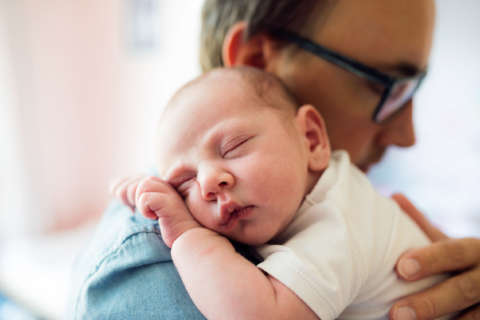WASHINGTON — A study found that babies of older fathers are more likely to be born with health issues, and their moms are more likely to develop diabetes during pregnancy.
A Stanford University School of Medicine study evaluating a decade of data on more than 40 million births reveals a woman is 28 percent more likely to develop gestational diabetes if her baby’s father is 45 years old or older, compared to fathers between 25 and 34.
Also, babies born to men 45 years old or older are 14 percent more likely to be admitted to the neonatal intensive care unit; 14 percent are more likely to be born prematurely; and 18 percent more likely to have seizures, compared to those whose fathers are between 25 and 34 years old.
Fathers 50 or older are 28 percent more likely to have a child needing to be admitted to the neonatal intensive care unit.
Risk increases incrementally
Comparing groups of men after the ages of 30, 35, 40, 45 and 50, researchers saw a steady increase in the risk for most of the outcomes.
“These are relatively rare outcomes,” said the study’s senior author Michael Eisenberg, director of male reproductive medicine and surgery at Stanford University. “So, even though the relative risk increases — the absolute risk for an individual couple still remains low.”
Comparing relative risk to absolute risk, Eisenberg uses an analogy of buying lottery tickets. “If you buy two lottery tickets, your chance of winning doubles. But, it’s still probably not going to happen. It’s a very rare event,” he said.
No suggestion of long-term issues
The findings reveal conditions babies are experiencing upon birth. “If you look longer-term, some of these (babies’ issues) may not have significant health manifestations,” Eisenberg said.
But, couples over recent decades have begun to have babies later in life, so Eisenberg believes potential issues are something they should keep in mind.
What potential parents need to know
Eisenberg said the oldest father ever was allegedly 96 years old, and some people may think there’s unlimited potential for fatherhood; but, that’s not necessarily the case. “Risk does go up, and couples should be more aware of that,” Eisenberg said.
Don’t forget the father
“A lot of the previous research has really focused on the woman and, certainly, the woman is very, very important,” Eisenberg said. “Just don’t forget the father, because paternal factors are important as well.”
A paper describing the study will be published online Nov. 1 in The British Medical Journal.








